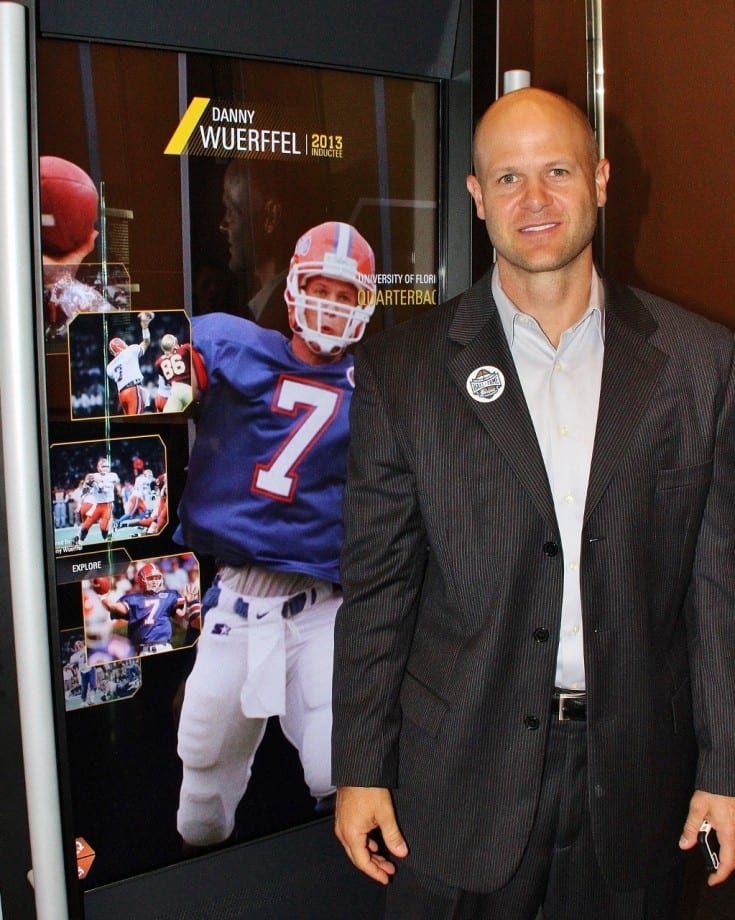 There were so many other places Danny Wuerffel could have been.
There were so many other places Danny Wuerffel could have been.
With a Heisman Trophy and a NFL career on his resume, he could have been coaching at his alma mater, the University of Florida. Or coaching with a NFL team. He could have been on TV, doing color commentating. Or hosting a radio call-in show.
But there he was, behind a cluttered desk, pushing paper in his office in Atlanta. After his NFL career ended in 2003, Wuerffel turned down more lucrative job offers to work with Desire Street Ministries, a non-profit, Christian outreach organization that helps the poor.
“If I had five lives to live, I’d do a lot of different things,” Wuerffel says. “But when you have one life, you have to choose very carefully.”
For Wuerffel, who threw 39 touchdown passes his senior year to lead the Gators to a national championship while winning the 1996 Heisman Trophy, that meant helping the less fortunate. As executive director of Desire Street Ministries, Wuerffel partners with ministries in five southern states.
His ministries’ mission statement is transforming neighborhoods two steps at a time. It’s a metaphor for walking along with someone in need, helping them as they go. Wuerffel says it’s the way to love your neighbor.
“That’s how we’re called to love people as Christians,” Wuerffel says. “The Word and the deed. The heart and the hand.”
When his NFL career ended in 2004 after he walked away from the Washington Redskins, Wuerffel told his wife, Jessica, he was going to work for a Christian outreach. She says, “I thought that’s what you were going to do.”
Wuerffel, despite his fame – “In Florida, there’s God and there’s Danny Wuerffel,” says Phil Mondy, a friend of Wuerffel. – has chosen the road less traveled. Wuerffel had a life-changing moment when he first met Mo Leverett, the missionary who founded Desire Street Ministries in 1990.
During his rookie season with the New Orleans Saints in 19997, Wuerffel asked Leverett to speak at the Saints chapel service. That led to Wuerffel’s visit to Desire Street Ministries and a walk through the Ninth Ward, an area in New Orleans that’s been called the murder capital of the country, and was labeled by criminologist Peter Scarf, “the murder capital of the murder capital” in a 2004 story in the New Orleans Times-Picayune. As Wuerffel walked through the impoverished neighborhood, he saw a little girl, who was holding a doll, walk out of a building he thought was empty and condemned.
“I couldn’t believe someone was living there,” Wuerffel says. “I was shocked. That’s when I realized something needed to be done.”
In Wuerffel’s rookie season with the Saints, he first got involved with Desire Street Ministries as a volunteer.
In 2003, with his seven-year NFL career behind him, Wuerffel did the unexpected. He walked away from lucrative career offers in broadcasting, business and coaching. Instead, he became the development director for Desire Street Ministries and the Desire Street Academy for boys.
After Hurricane Katrina destroyed Wuerffel’s home in New Orleans and the ministry’s school in 2005, Desire Street Ministries began to take a new shape and eventually moved its headquarters to Atlanta. The school closed and the ministry’s emphasis shifted from starting new organizations to partnering with existing outreaches, walking alongside ministries and helping them through the traumas and challenges of living in an impoverished inner city neighborhood.
Bryan Kelly, pastor of Common Ground ministry in Montgomery, Ala., has partnered with Desire Street for about eight years. Living in the heart of an impoverished neighborhood, Kelly has walked alongside those he’s helped. The challenges – gang violence, domestic violence – are close and real.
“Frankly, Danny and his program help me and others like me not quit,” Kelly says. “What they’ve done for me is really walk alongside me, guiding me for about eight years now. They’ve guided me through a lot of personal struggle and a lot of neighborhood challenges.”
Ciera, a young girl who lived across the street from Kelly, is an example of the life-changing impact of the partnership of Desire Street and Common Ground. Five years ago, while Ciera was at an overnight summer camp put on by Common Ground, her mother was shot and killed in her home. Common Ground played a crucial role in that young girl’s life, as a hardship led to an open door.
“She came to know the Lord in the next year or so,” Kelly says. “We were able to help that family and walk with them for the last five years now.”
Next spring, Ciera, who moved into her uncle’s home, will become the first in her family to graduate from high school and she plans on going to college. All of her sisters were pregnant by age 15 and out of school.
“It’s a big deal in terms of the trajectory of that family,” Kelly says.
A week after Hurricane Katrina ravaged the Gulf Coast in 2005, uprooting half a million people, Wuerffel sought refuge in a church. It was 5 a.m. His split level home in New Orleans was underwater, destroying nearly everything he owned. Several of the students from Desire Street Ministries school were still missing.
But there he sat, alone in a church, playing the piano and singing old hymns. Tears rolled down his cheeks as he sang, “On Christ the solid rock I stand.”
“As I sang in that church, I had such an overwhelming sense of peace,” Wuerffel says.
Peace should have been the last thing he felt that day.
And yet Wuerffel found peace as he played the piano and sang gospel hymns. It was like a Peter-and-John experience, similar to when the two disciples sang praises while shackled in prison.
“The song says that in every flood, in every high and stormy gale, his anchor holds,” Wuerffel says.
At a moment he had lost so much – his home was going to be bulldozed – he saw what was important.
“How much time do we spend thinking we need this and that and worry about what we don’t have,” Wuerffel says. “I have my wife, my son, and we have food and shelter as I stayed at my parents.”
Possessions, he realized, don’t bring lasting peace. A relationship with God does.
Throughout the hardship of Katrina, Wuerffel saw God’s hand moving. Everything seemed to be unraveling for Desire Street Ministries after Katrina damaged the academy’s 36,000-square foot building. But the ministry is going strong today, lifted by ongoing prayer and donations.
“God has proven himself to be gracious and kind,” Wuerffel says. “My wife and I have felt an incredible, overwhelming sense of God’s provision.”
As the son of an Air Force chaplain, Wuerffel grew up in a Christian home and in his sophomore year in college his faith became his own when he made a personal commitment and confession of need to God.
“I didn’t know what an authentic relationship with God was,” Wuerffel says. “I had a reassessment of who I was in God’s eyes. And I became more aware of who I was and the sin in my heart. That led me to seeking the cross and Christ in a deeper way.”
But even as a young man, Wuerffel always had this everyone-is-my-friend personality. Even though he was the big jock, the popular sports star, he got along with everyone. He wasn’t cliquish, thinking he was better than someone else just because he was the star athlete.
“He got along with everyone,” says Lana Wood, his ninth grade English teacher. “He was everyone’s friend. He talked with everyone.”
Using his “social capital,” Wuerffel now spends a lot of his time fundraising. He wears many hats as the executive director.
“There is no typical day,” Wuerffel says. “Which I like. Every day is a little different. I get to spend some time with our leaders and people in the ministry in the neighborhoods. And that’s one of the favorite parts of my job.”
A big part of his job is interacting with groups, sometimes sharing stories of his celebrated college career. Wuerffel, who was inducted into the NCAA’s Hall of Fame in 2013 and was named the Gators’ offensive player of the century by the Gainesville Sun, often adds a little humor to his stories. In a talk with a group at Mobile, Ala., Wuerffel got a chuckle when he said people always warn him to be careful when he goes to Alabama because people there will give him trouble.
“I always say, ‘That’s funny. They never gave me any trouble when I was playing,’” Wuerffel says.
The crowd with their Crimson Tide roots chuckled.
“A big part of my job is raising the resources to keep the work going,” Wuerffel says.
Desire Street is more than an evangelical outreach, more than sharing the salvation message. They also help with health care, housing and economic development, youth development and things that help make a thriving community.
“We have launched and helped start schools,” Wuerffel says. “We’ve helped start several churches. We’ve worked with medical clinics, with housing initiatives and job training initiatives. Our mission now is to come alongside people who are trying to do those kinds of things.”
In turning a neighborhood around, Wuerffel says there isn’t just one, big challenge. It’s overcoming many challenges, including drugs, gangs, divorce, bad grades and bad attitudes. But it begins with the family.
“When you have such a breakdown in the family structure and there’s few positive male role models, it’s hard,” Wuerffel says. “A lack of hope and a lack of opportunity are the biggest challenges to overcome.”
Recently, Wuerffel was at a birthday celebration for a young man who had just turned 25 and had been supported by Desire Street Ministries.
“It was a huge birthday party and I asked him why it was so important,” Wuerffel says. “And he said he never thought he’d live to be 25.”
Wuerffel’s success on the football field, the fame he earned, has impacted his ability to help others today.
“The platform of being a former Heisman Trophy winner is quit broad,” Wuerffel says. “I’ve heard it said that one could win the Nobel Peace Prize and be introduced as the Heisman Trophy winner. It just opens a lot of doors. Opens a lot of conversations.”
Wuerffel’s emphasis since leaving the NFL has been giving that helping hand. Not chasing the big buck. At least, not money for himself. Solutions to the challenges inner city families face begin with the dollar.
“One of the struggles a lot of leaders have in an inner city is that they don’t have access to resource networks,” Wuerffel says. “So, we like to invest our time and energy in what we call social capital.”
Changing lives takes money. Wuerffel has 11 on his staff. Then counting the ministries his outreach networks with, he figured there’s about 100 people. That networking requires a lot of travel, which is another experience.
And the mission is the transformation of the hearts of the people and the transformation of their neighborhood, making it a safer and better place to live.
“It all starts in the hearts of the people, but it also has an outward focus on seeing a neighborhood actually change,” Wuerffel says. “A lot of times, people try to help kids beat the odds by getting them out of their neighborhood. Our dream is to change the odds right where they’re at and they’ll end up in a good spot in that community.”
Now 40, Wuerffel admits there are times he still misses football. But other things, things more important than a game, motivate him today.
“There are times when I miss the competition, the adrenaline and the challenge of playing sports at a high level,” Wuerffel says. “But the part I loved most about football was the dynamics of team. And I really feel that’s a big part of my life now. I still get to work with a wide variety of people. Different races and cultures. Different economic backgrounds.”
And he tries to unite people who are very different around a common goal.
“That’s very exciting to me,” he says. “So, I still get that. And when I go to bed at night, I want to know that I invested my life, my day, in something that mattered.”
And to Wuerffel, people matter.





